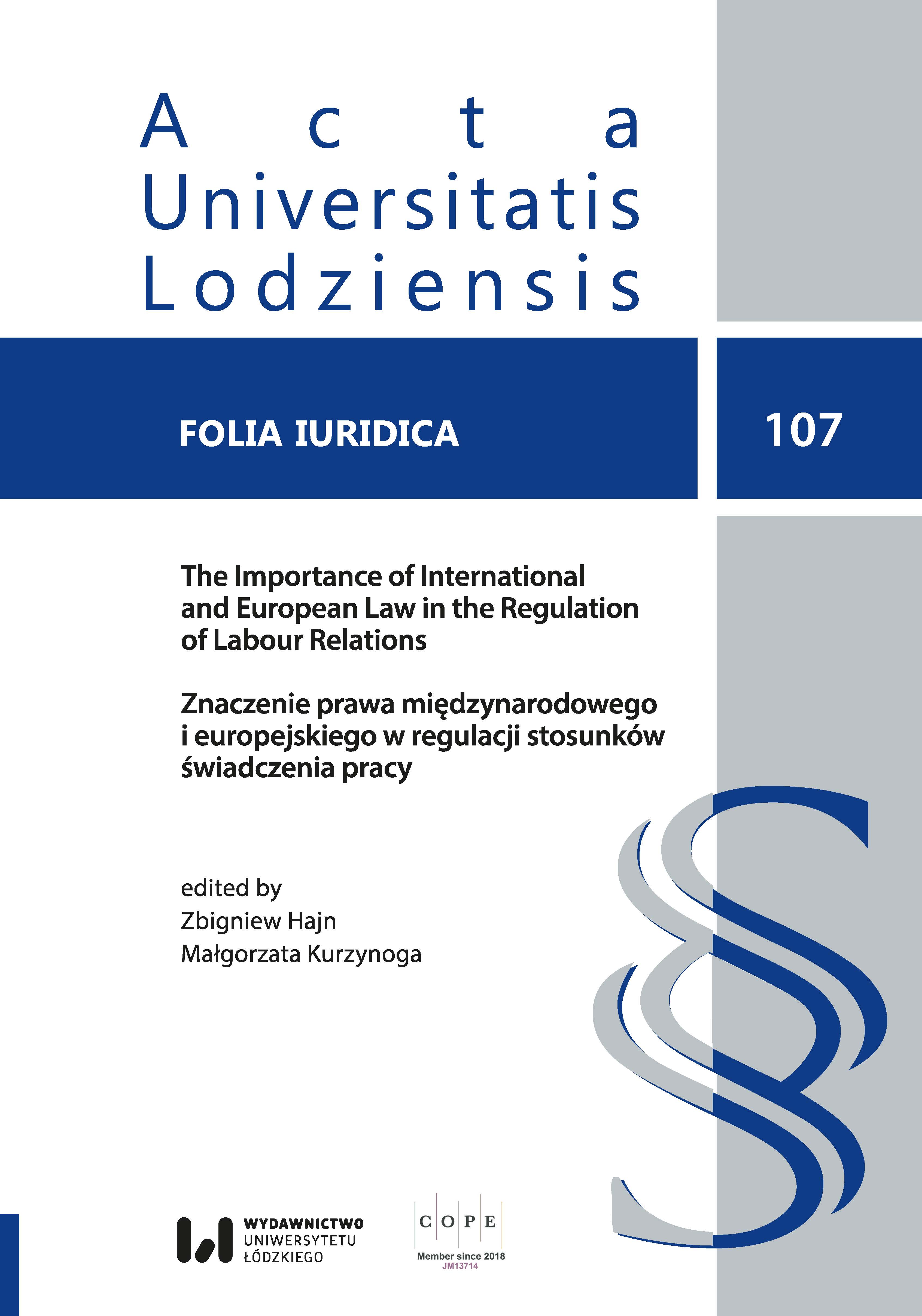Zalecenie MOP nr 198 a pracownicy samozatrudnieni
DOI:
https://doi.org/10.18778/0208-6069.107.03Słowa kluczowe:
samozatrudniony pracownik, zależny rzeczywiście samozatrudniony pracownik, rzeczywiście i autonomicznie samozatrudniony pracownik, stosunek pracyAbstrakt
Artykuł dotyczy sytuacji prawnej pracowników samozatrudnionych w międzynarodowym prawie pracy. W szczególności koncentruje się na dominującej w MOP i jasno wyrażonej w Zaleceniu nr 198 z 2006 r. dotyczącym stosunku pracy koncepcji dychotomicznego podziału pracowników na pracowników najemnych i rzeczywiście samozatrudnionych oraz uzależnienia zakresu ich ochrony od przynależności do jednej z tych kategorii. Autor stawia pytanie, czy jest to najwłaściwsza droga do zapewnienia ochrony pracownikom świadczącym pracę w innych niż umowa o pracę formach ustaleń umownych, w tym osobom, które określa jako „rzeczywiście samozatrudnieni pracownicy zależni”. Osobny wątek rozważań stanowi sytuacja prawna pracowników rzeczywiście i autonomicznie samozatrudnionych.
Pobrania
Bibliografia
Bignami, Renato. Giuseppe Casale. Mario Fasani. 2013. Labour inspection and the employment relationship. Working Document Number 28. Geneva: Internation Labour Organization.
Google Scholar
Collins, Hugh. 1990. “Independent Contractors and the Challenge of Vertical Disintegration to Employment Protection Laws.” Oxford Journal of Legal Studies 10: 353–384. https://doi.org/10.1093/ojls/10.3.353
Google Scholar
Commission. 2021/1. Second-Phase Consultation of Social Partners Under Article 154 TFEU on Possible Action Addressing the Challenges Related to Working Conditions in Platform Work (Consultation Document) C(2021) 4230 final.
Google Scholar
Commission. 2021/2. Proposal for a Directive of the European Parliament and of the Council on improving working conditions in platform work, COM(2021) 762 final.
Google Scholar
Commission. 2021/3. Guidelines on the application of EU competition law to collective agreements regarding the working conditions of solo self-employed persons, C(2021) 8838 final.
Google Scholar
Conclusions of the Meeting of Experts on Non-Standard Forms of Employment, 323rd Session, 12–27 March 2015, Geneva. 50–53. http://www.ilo.org/wcmsp5/groups/public/---ed_norm/---relconf/documents/meetingdocument/wcms_354090.pdf (accessed: 15.01.2022).
Google Scholar
Countouris, Nicola. Valerio De Stefano. 2019. New trade union strategies for new forms of employment. Brussels: ETUC. https://doi.org/10.1177/2031952519872323
Google Scholar
Creighton, Breen. Shae McCrystal. 2016. “Who is a ‘Worker’ in International Law?” Comparative Labor Law and Policy Journal 37(3): 691–725.
Google Scholar
De Stefano, Valerio. 2021. “Not as simple as it seems: The ILO and the personal scope of International Labour Standards.” International Labour Review 160(3): 387–406. https://doi.org/10.1111/ilr.12201
Google Scholar
Duraj, Tomasz. 2023. „Prawny model ochrony pracy na własny rachunek – wprowadzenie do dyskusji.” Acta Universitatis Lodziensis. Folia Iuridica 101: 21–34. https://doi.org/10.18778/0208-6069.101.01
Google Scholar
European Commission. 2021. Second-Phase Consultation of Social Partners Under Article 154 TFEU on Possible Action Addressing the Challenges Related to Working Conditions in Platform Work (Consultation Document), Commission C(2021) 4230 final.
Google Scholar
European Parliament. 2007. Resolution of 11th July 2007 on modernising labour law to meet the challenges of the 21st century (2007/2023(INI).
Google Scholar
Governing, Body. 2000. Report of the Meeting of Experts on Workers in Situations Needing Protection. Geneva: International Labour Office.
Google Scholar
Governing, Body. 2015. Conclusions of the Meeting of Experts on Non-Standard Forms of Employment. Geneva: International Labour Office.
Google Scholar
ILC. 1949. (91st Session), General Survey of the Reports Concerning the Protection of Wages Convention, 1949 (No. 95) and the Protection of Wages Recommendation (No. 85), Report III (Part 1B). Geneva: International Labour Office.
Google Scholar
ILC. 1990. (77th Session), Record of Proceedings, Conclusions concerning the promotion of self-employment. Geneva: International Labour Office.
Google Scholar
ILC. 1997. (85th Session), Record of Proceedings, Committee reports. Geneva: International Labour Office. https://www.ilo.org/public/libdoc/ilo/P/09616/09616%281990-77%29.pdf (accessed: 18.10.2023).
Google Scholar
ILC. 1999. (87th Session), Report of the Director-General, Decent Work. Geneva: International Labour Office.
Google Scholar
ILC. 2003. (91st Session), The scope of the employment relationship. Report V. Geneva: International Labour Office.
Google Scholar
ILC. 2006. (95th Session), The employment relationship. Report V(1). Geneva: International Labour Office.
Google Scholar
ILC. 2020. (109th Session), Promoting employment and decent work in a changing landscape. Report of the Committee of Experts on the Application of Conventions and Recommendations (articles 19, 22 and 35 of the Constitution). Report III (Part B). Geneva: International Labour Office.
Google Scholar
ILO. 2016. Non-standard employment around the world: Understanding challenges, shaping prospects. Geneva: International Labour Office.
Google Scholar
ILO. 2018. Freedom of Association. Compilation of decisions of the Committee on Freedom of Association. Geneva: International Labour Office.
Google Scholar
ILO. 2019. Global Commission on the Future of Work, Work for a Brighter Future. Geneva: International Labour Office.
Google Scholar
ILO. 2021. World Employment and Social Outlook 2021: The role of digital labour platforms in transforming the world of work. Geneva: International Labour Office.
Google Scholar
Kösters, Lian. Wendy Smits. 2022. “‘Genuine’ or ‘Quasi’ Self-Employment: Who Can Tell?” Social Indicators Research 161: 191–224. https://doi.org/10.1007/s11205-021-02794-5
Google Scholar
Musiała, Anna. 2014. “Prawna problematyka świadczenia pracy przez samozatrudnionego ekonomicznie zależnego.” Monitor Prawa Pracy 2: 69–73.
Google Scholar
O’Brien, Charlotte. Eleonor Spaventa. Joyce De Coninck. 2016 Comparative Report 2015. The concept of worker under Article 45 TFEU and certain non-standard forms of employment. Brussels: European Commission. https://eprints.whiterose.ac.uk/99808/1/ComparativeReport2015_ConceptOfWorker_20160426FINAL_2_.pdf (accessed: 14.11.2023).
Google Scholar
Office of the Legal Adviser. 2006. Manual for drafting ILO instruments. Geneva: International Labour Office.
Google Scholar
Perulli, Adalberto. 2003. Economically dependent/quasi-subordinate (parasubordinate) employment: legal, social and economic aspects. Brussels.
Google Scholar
Report of the Meeting of Experts on Workers in Situations Needing Protection. 2000. Geneva 15–19 May 2000.
Google Scholar
Servais, Jean-Michel. 2017. International Labour Law. Alphen aan den Rijn: Wolters Kluwer.
Google Scholar
Skupień, Dagmara. 2022. “Praca na własny rachunek w ramach Unii Europejskiej w świetle prawa i orzecznictwa.” Studia z Zakresu Prawa Pracy i Polityki Społecznej 29(3): 279–290. https://doi.org/10.4467/25444654SPP.22.023.16568
Google Scholar
Williams, Colin. Frédéric Lapeyre. 2016. Dependent self-employment: Trends, challenges and policy responses in the EU Dependent self-employment. Geneva: International Labour Organization. https://doi.org/10.2139/ssrn.3082819
Google Scholar
Pobrania
Opublikowane
Wersje
- 2024-08-06 - (2)
- 2024-06-30 - (1)
Jak cytować
Licencja

Utwór dostępny jest na licencji Creative Commons Uznanie autorstwa – Użycie niekomercyjne – Bez utworów zależnych 4.0 Międzynarodowe.














